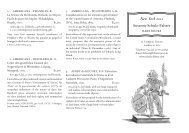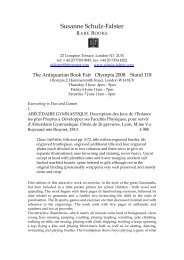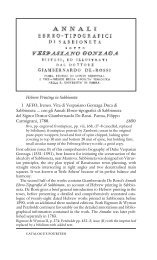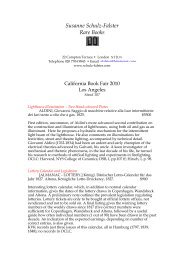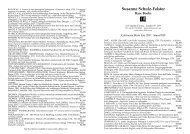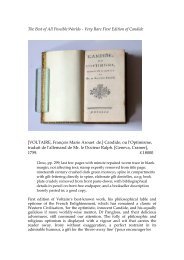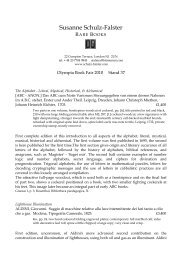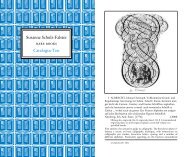Susanne Schulz-Falster Catalogue Ten
Susanne Schulz-Falster Catalogue Ten
Susanne Schulz-Falster Catalogue Ten
Create successful ePaper yourself
Turn your PDF publications into a flip-book with our unique Google optimized e-Paper software.
identiWes ‘fancy’ coaches and carriages as one of the more visible signs of<br />
luxury. He condemns luxury as the ‘lack of balance between exuberance and<br />
want, and maintains that it causes idleness in a large section of the population<br />
and weakens the national spirit.<br />
The book was reprinted together with a number of other pieces in his<br />
‘Paradoxes’, 1775.<br />
Cioranescu 22814; Contades, Le Driving en France, 69; ESTC t112982.<br />
91 DIDEROT, Denis. Jakob und sein Herr, aus Diderots<br />
ungedrucktem Nachlasse. Erster Theil [– Zweiter Theil]. Berlin,<br />
J. F. Unger, 1792. £2250<br />
Two volumes 8vo, engraved frontispiece, pp. [ii], 330, [2]; 339;<br />
circular title vignette to volume one; some light foxing to Wrst two<br />
leaves, else very clean; printed on ‘papier velin’; entirely uncut in the<br />
susanne schulz-falster rare books catalogue ten<br />
original marbled paper stiV wrappers, some creases to spine, joints<br />
repaired; a very Wne copy on special paper.<br />
First edition, very rare, of Diderot’s Jacques le Fataliste, Wrst published in this<br />
German translation, with the French version not printed until 1796. It is<br />
Diderot’s last novel, published posthumously and clearly inspired by<br />
Sterne’s Tristram Shandy, which it resembles in the subordination of narrative<br />
to digression. It is an entirely modern novel, a novel about authority<br />
and ‘mastery’, a Wction about the telling of Wctions. Its climax is a great quarrel<br />
in which Jacques, the insubordinate servant and teller of stories, establishes<br />
his predominance and mastery for all time.<br />
Around the central story-line of Jacques’ humorous narration of his romantic<br />
aVairs, the author of the Encyclopédie presents a major work of innovative<br />
Wction, that investigates philosophical and literary questions, such<br />
as art, time, reality, freedom and the deWnition of the novel itself. The book<br />
foreshadows major developments in the nineteenth and twentieth century<br />
literary techniques, exchanging the rational and classical for shifting perspectives<br />
of time, personality, and viewpoint.<br />
Curiously the volumes were issued unstitched, held together just by the<br />
stiV wrappers, which were glued to the spine. Jacques le Fataliste, though<br />
quite common in the later French version, is a very rare book indeed, in the<br />
original German translation.<br />
Adams JF19; Fromm 7194; RLIN and OCLC list copies at Harvard and Yale only;<br />
not in Borst; see Raddatz, ZEIT Bibliothek der 100 Bücher pp. 136–139.<br />
Uncut in Wrappers – as Issued<br />
92 [DIDEROT, Denis.] Pensés Philosophiques. Amsterdam,<br />
1772. £220<br />
8vo in 8s and 4s, pp. 90; title page vignette; uncut in the original blue<br />
wrappers, spine very worn, with small portion missing at foot of spine,<br />
corners bent; a wide-margined copy.<br />
Later edition of Diderot’s brilliant Wrst independent publication, Wrst published<br />
in 1746, which is full of eminently quotable epigrams in the tradition<br />
of Pascal or La Rochefoucauld, such as ‘It can be required of me that I look<br />
for the truth, but not that I should Wnd it’ (XXIX). The Pensées demonstrate<br />
the existence of God through the order of nature. However, of all the<br />
philosophico-religious positions presented in this work, scepticism is argued<br />
most persuasively, and can be seen as Diderot’s chosen position at the<br />
time. The work made a considerable impact and earned the compliment of<br />
being condemned to be burned by the Paris Parlement, as ‘presenting to<br />
restless and reckless spirits the venom of the most criminal opinions that the<br />
depravity of human reason is capable of’. It became one of the most popular<br />
of Diderot’s works, and went through no fewer than eighteen editions during<br />
the eighteenth century. This separately issued volume formed part of<br />
the Wrst collected edition of Diderot’s works.<br />
For Wrst edition see Tchemerzine IV, p. 427; separate issue of one part from the<br />
Wrst collected edition of Diderot’s works.





